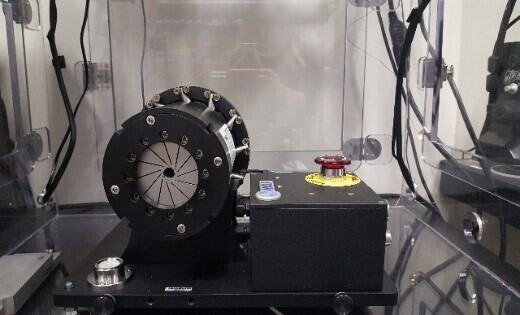Radial Force Testing
Radial force testing is used to determine the stiffness (hoop strength) of a medical device when placed under radial compressive forces, both loading and unloading. Devices that are commonly tested include balloons, stents, stent grafts, and feminine hygiene products, among other devices that are required to apply a chronic outward force. The importance of radial force testing in the medical device development process is perhaps best illustrated with an example. The following case study shows the importance of radial force in the functionality of a self-expandable stent.
Case Study: The Self-Expandable Stent
Accurate stent sizing is crucial. If a stent does not exert enough radial force to stay lodged in its desired position, it may migrate. Stent migration can cause a number of different problems, paravalvular leakage being one of them [1]. When paravalvular leakage occurs, blood flows through the stent and proceeds through cardiac tissue. Paravalvular leakage can cause heart failure, hemolytic anemia, and infectious endocarditis. [2]
Conversely, a stent that exerts too much force on its host vessel can cause vessel wall degeneration and damage. [1] Self-expandable stents, in particular, can be difficult to match to the proper vessel size. Self-expandable stents show a chronic outward radial force once they are deployed in the body. This can result in negative chronic recoil. Negative chronic recoil causes the vessel to expand outward, becoming larger than it naturally was. Other adverse reactions that may occur from improper stent sizing include: in-stent restenosis, thrombosis, and neo intimal proliferation.
Performing radial force testing on your device can help quantitatively characterize device functionality and performance, in turn allowing you to accurately assess the safety and effectiveness of your product.
Our Method
Our lab is ISO 17025 accredited in regards to radial force testing per ASTM 3067-14 and ISO 25539. Additionally, with over 30 years of experience developing test methods and evaluating a wide variety of medical devices, we have the ability to develop unique test methods tailored to your needs.
 Figure 1. MSI RX550 Radial Force Tester at MED Institute.
Figure 1. MSI RX550 Radial Force Tester at MED Institute.
Our Services
At MED Institute, we have the tools and experience to help with your radial force needs. Contact us so that we can help you make products and therapies that will improve patient outcomes.
If you have any questions or need any additional information, please contact:
Justin Metcalf, Director of Engineering Services
jmetcalf@medinstitute.com
765.463.1633
References
| [1] | M. S. Cabrera, C. W. Oomens and F. P. Baaijens, “Understanding the requirements of self-expandable stents for heart valve replacement: Radial force, hoop force and equilibrium,” Journal of the Mechanical Behavior of Biomedical Materials, vol. 68, pp. 252-264, 2017. |
| [2] | D. Smolka and M. W. Wojakowski, “Paravalvular leak – important complication after implantation of prosthetic valve,” European Society of Cardiology, 8 November 2010. [Online]. Available: https://www.escardio.org/Journals/E-Journal-of-Cardiology-Practice/Volume-9/Paravalvular-leak-important-complication-after-implantation-of-prosthetic-valv. [Accessed 30 August 2017]. |
Get email about news, services, and events from MED Institute.
OUR COMMITMENT
We are committed to consistently performing services with high quality, that deliver exceptional results, and add value to the client’s business.
For client surveys sent in 2024, we received ratings of 4.98/5 points (13).
